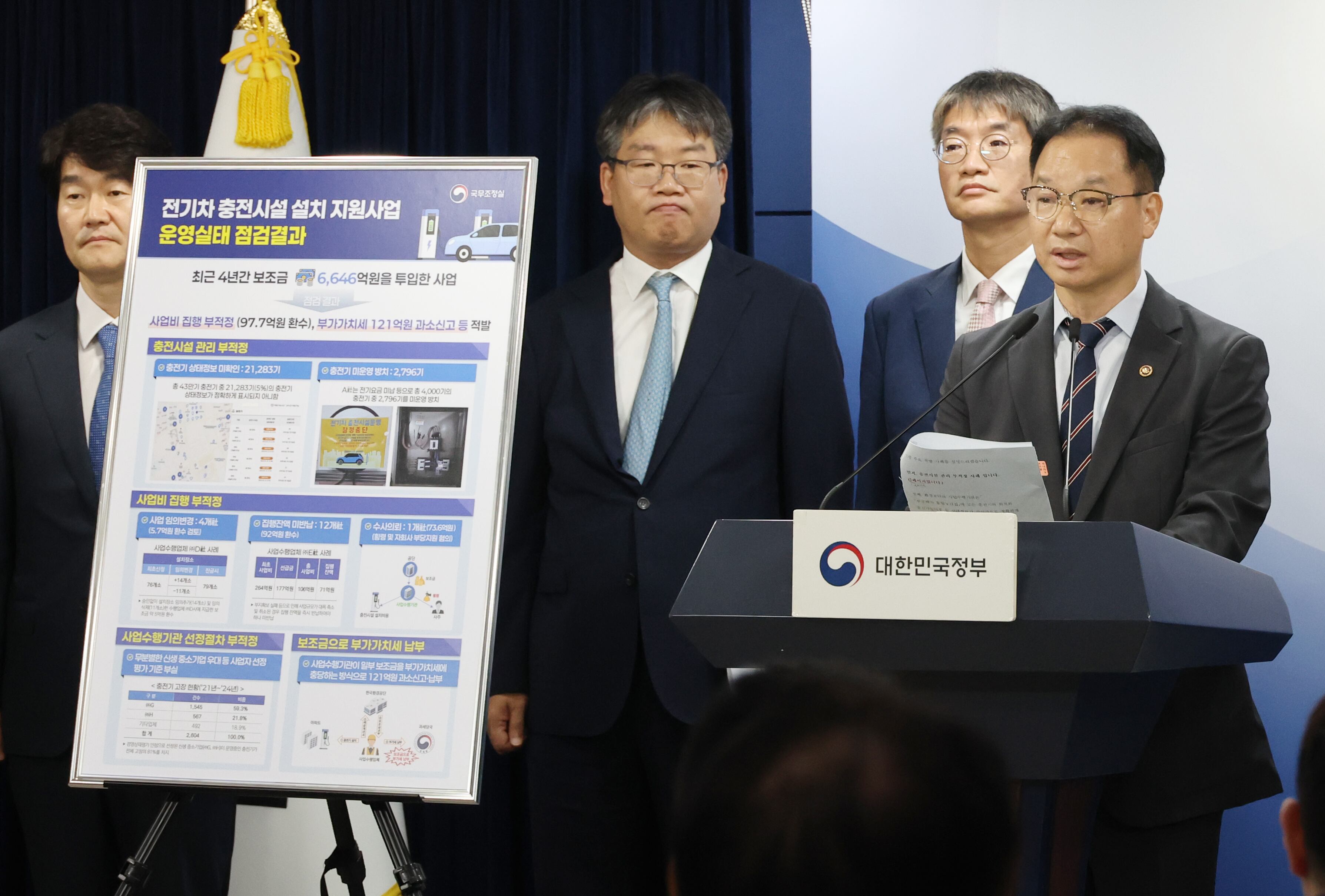
A government-supported project to install electric vehicle (EV) charging stations, which injects hundreds of billions of won annually, has been revealed to be poorly managed. It was found that 2,796 EV chargers installed with government subsidies were left unused for over a year, and one company involved in the installation project embezzled approximately 7.3 billion Korean won in subsidies.
According to the Office for Government Policy Coordination Government Joint Anti-Corruption Prevention Task Force (Director Kim Young-soo, Office for Government Policy Coordination First Vice Minister of State Affairs) on the 17th, the government has been subsidizing part of the cost for public EV charging facilities to expand EV adoption. The subsidies cover up to 75 million won per fast charger and 3.5 million won per slow charger. The project has received 194.5 billion won in 2022, 292.5 billion won in 2023, 401.5 billion won last year, and 618.7 billion won is planned for this year.
A review by the task force and the Ministry of Environment into the 664.6 billion won in subsidies executed from 2020 to 2023 found that Company A, which installed 4,000 chargers nationwide with subsidies, had left 2,796 of them unused for over a year due to financial difficulties preventing payment of electricity bills. Despite this, Company A made no efforts toward normalization, such as paying overdue bills, selling the chargers, or transferring the business.
Meanwhile, the Korea Environment Corporation publicly discloses the location and charging status of approximately 470,000 chargers nationwide in real time via the ‘Zero-Emission Vehicle Integrated Website.’ However, it was confirmed that the status of 21,283 chargers—whether operational or faulty—had not been updated.
Additionally, advance payments were issued to companies selected for the fast charger subsidy project. However, even when these companies failed to install chargers due to reasons like site acquisition failures, they did not return the advance payments. Among the advance payments for 29 projects, 9.2 billion won remained unreturned despite not being used for charger installations, with 5.9 billion won still unreturned even after the task force and Ministry of Environment’s investigation concluded.
Company B was found to have embezzled 7.36 billion won out of the 17.7 billion won in advance payments it received, using the funds for other purposes. Company B established a 100% subsidiary and purchased chargers through this subsidiary instead of directly from manufacturers, thereby pocketing the price difference.
The task force and Ministry of Environment also identified issues in the business selection process. Companies C and D received full marks in the ‘management status’ evaluation during the selection phase due to being newly established small businesses, allowing them to secure subsidies for slow charger installations in 2022. However, of the 2,604 charger malfunctions reported over the past four years, 2,112 cases (81.1%) occurred in chargers installed by Companies C and D. Additionally, businesses that violated contractual obligations were supposed to face disadvantages in future selections, but the Korea Environment Corporation and the Korea Automobile Environmental Association, responsible for selection, failed to impose such penalties.
The task force and Ministry of Environment ordered the Korea Environment Corporation and the Korea Automobile Environmental Association to inspect all chargers marked as non-operational on the website for an extended period and to deduct points from businesses with many chargers whose status information is not updated in real time during future selections. They also demanded immediate recovery of advance payments held by businesses that have not installed chargers. The task force and Ministry of Environment referred Company B and its representative to investigative authorities for alleged breach of trust, violation of subsidy laws, and unfair trade practices.
Kim Young-soo, Office for Government Policy Coordination First Vice Minister of State Affairs, stated, “Based on the results of this inspection, the government will manage the EV charging facility installation support project more transparently and strictly, and through continuous system improvements and thorough post-management, we will do our best to ensure that citizens can safely and conveniently use EV charging facilities.”
Post a Comment